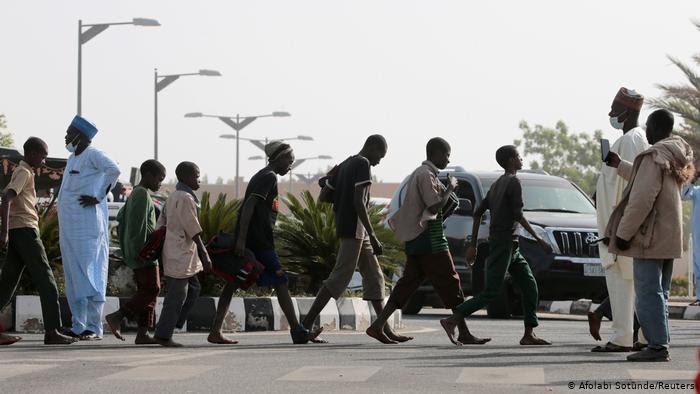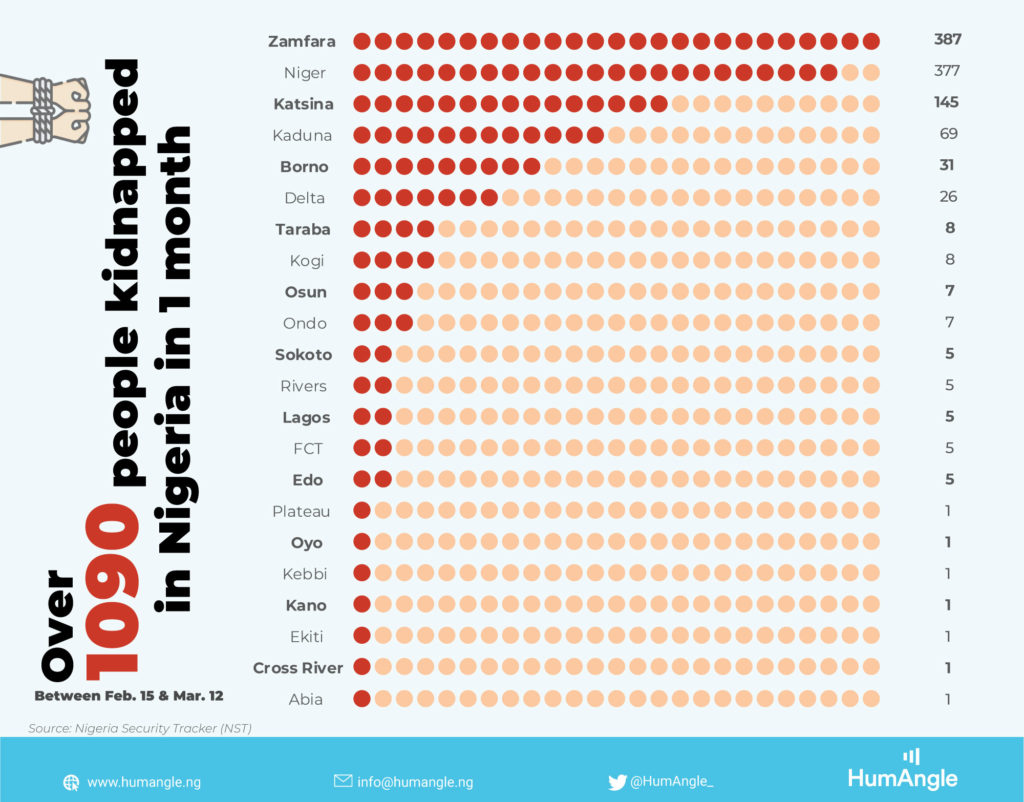Over 1,090 People Were Kidnapped In Nigeria In 1 Month. Last Year, It Took Nearly 5.
In 2020, an average of 240 people were abducted every month.

One thousand and ninety-seven (1,097) people in Nigeria were victims of abduction in the last one month, an analysis of data from the Nigeria Security Tracker (NST) has shown.
The unusually high number was recorded between Feb. 15 and March 12, according to the data-collection platform run by the Council on Foreign Relations. The incidents spanned 22 states, including the Federal Capital Territory, Abuja.
The data also revealed that at least 729 people lost their lives to insecurity in the country, including 383 civilians and 62 security agents.
The highest rate of kidnapping was recorded in Zamfara where 387 people were victims, followed by Niger (377), Katsina (145), and Kaduna (69). All four of the hardest-hit states are in Northwest Nigeria except Niger, which is located in the north-central region.
Other states that had a high number of abduction victims in the period were Borno (31), Delta (26), Kogi (8), and Taraba (8).
The rate of abduction is especially troubling compared to figures from last year. According to data gathered by the NST, a total of 2,879 people were abducted in Nigeria. This means on average 240 people were abducted every month. In other words, in 2020, it would have taken a little over four and a half months for 1,097 people to have been kidnapped—as opposed to one.
Schoolchildren and undergraduates have increasingly become the targets of terrorists in Northwest Nigeria who abducted tens or hundreds of people at a go with hopes of getting ransoms.
On Friday, Feb. 26, 317 female students of Government Girls Secondary School, Jangebe, in Zamfara State, were reported kidnapped. Upon their release a few days later, the state government gave the number of the victims as 279.
In early March, 50 travellers were said to have been kidnapped in Niger State along the Tegina-Minna road in Rafi Local Government Area. This came three weeks after 40 passengers of the state transport authority were abducted in the same region.
On March 3, 50 residents of Tungar Baushe in Zamfara’s Maru Local Government Area were kidnapped after gunmen raided the community.
“The armed men then came and began to burn grain stores and houses of the residents. They intercepted some of the residents who had run to take cover at Ruwan Tofa community. They also came to Tungar Baushe and abducted 50 persons there,” one resident told Daily Trust newspaper.
“They did not spare anyone including women, nursing mothers and children. They herded them into bush. We are now counting losses following this attack even though no one was killed.”
Also in Zamfara, 100 miners were reported to have been abducted between Anka and Maru Local Government Areas. According to the Emir of Anka, Alhaji Attahiru Ahmad, the incident occurred on March 2.
Kaduna State has similarly been hit by various attacks involving students at various levels. Between Thursday and Friday, March 12, terrorists abducted at least 39 students of the Federal College of Forestry Mechanisation, Afaka, and later reached out to the parents demanding the sum of N500 million. On Saturday, the abductors released a video showing the students, who pleaded for the government to secure their release.
“We appeal to the government to come and rescue us. Most of us here have been badly injured,” one of them, Benson Emmanuel, said.
“Time is going. Most of us here are having health issues and they are complaining about the government trying to send security operatives to come and rescue us from here, which is almost impossible. Because these people have surrounded us, saying [that] anybody that comes from anywhere to come and rescue us or do anything by force, they are going to take our lives.”
Nigeria’s President Muhammadu Buhari, last Saturday, warned that his administration would not condone the destruction of schools by “would-be terrorists and bandits.”
“Our military may be efficient and well-armed but it needs good efforts for the nation’s defence and the local population must rise to this challenge of the moment,” he added, according to senior presidential spokesman Garba Shehu.
Support Our Journalism
There are millions of ordinary people affected by conflict in Africa whose stories are missing in the mainstream media. HumAngle is determined to tell those challenging and under-reported stories, hoping that the people impacted by these conflicts will find the safety and security they deserve.
To ensure that we continue to provide public service coverage, we have a small favour to ask you. We want you to be part of our journalistic endeavour by contributing a token to us.
Your donation will further promote a robust, free, and independent media.
Donate HereStay Closer To The Stories That Matter





